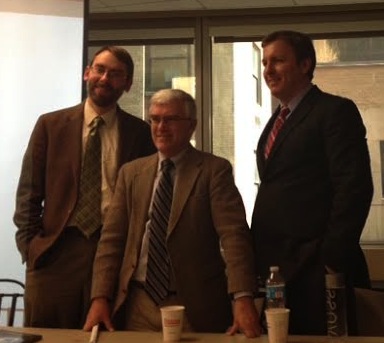Politics professors discuss the big ideas behind conservatism
Financial District, NEW YORK--On March 4, 2014, the Young Americans for Freedom hosted a panel with King's political professors Dr. David Corbin, Dr. Matthew Parks and Dr. David Innes to discuss the big ideas behind conservatism. Moderator Eduardo Miranda asked these professors questions about a variety of topics, including American conservatism as an ideology, anti-poverty and welfare policies and influential conservative literature, before opening the floor up to questions from the audience. “The conservative is the one who submits to nature, rather than wants to subdue nature,” said Parks. He added that “the conservative approach to politics is fundamentally different from the alternatives presented by various competing 'isms,' all of which...at their core are founded upon one central observation of injustice in the world that must be overcome, and when it’s overcome, the expectation is that all will be right, that there’s some sense of a utopian possibility out there, and a conservative essentially punctures all of those balloons, and tries to operate within the restraints of a fallen world.”
“Conservatism...is more of a temperament, a cautionary stance, a stance that realizes that this world is not perfectable, and if you try to perfect what is imperfectable, you will hurt people and break things,” added Corbin.
Corbin went on to speak about the variety of pathways to conservative orientation that lead one to recognize man’s fallenness, including that of philosophy, Christianity, necessity, parenting, friendship and other “Joe the Plumber”-type approaches.
Speaking about epistemic humility, the complexity of human life and the cautious conservative approach to Obamacare, Innes said, “You cannot possibly know enough to make all of those decisions, even the major decisions, well, so you disperse the power, disperse the decision-making, because people tend to know what is good for them better than people far distant from them.”
When asked whether there is such a thing as distinct American conservatism, Parks reflected on how conservatives are “in the business of saying ‘no’ or ‘not yet’ or 'not so fast.'” Politically, Parks thinks this is a bad--and failed--strategy. He believes that the heart of conservatism is “more robust than that.”
“The conservative idea, at its best, recognizes that there’s an order to the world, and that that order starts...in politics, with an understanding of human nature....the excellencies and limitations...that understanding human nature is not about Americans versus Russians,” Parks said, acknowledging that there are obvious cultural differences between the two.
Corbin further expanded on the idea of fallen human nature, noting that the left emphasizes this conservative view, strategically minimizing the emphasis on redemption that he believes should be a central to the conservative view. He spoke of how the Biblical narrative of creation, fall and redemption offers a fallen view of humanity that needs justice, but also stresses hope and liberality.
This year is the fiftieth anniversary of President Lyndon B. Johnson's War on Poverty. Speaking about Alexis de Tocqueville’s views on public versus private charity, Innes said, “He favors private charity because it not only binds people together, but it addresses the needs more accurately, more responsibly...it doesn’t empower a central bureaucracy...but also it knits people together socially. The giver exercises his heart in giving, and that’s good for the giver’s character. The receiver receives with gratitude and not as an entitlement.” Innes noted that de Tocqueville recognizes that there is a proper place for public charity, e.g. natural disasters.
“[Private charity] speaks to the natural bonds. Within a polis...there is a natural inequality in this world that lends itself to socioeconomic inequality,”Corbin said in reference to the talents that are dispersed throughout a population of individuals. However, he noted that there is also “a natural equality," namely that all men are created equal.
Corbin explained that individuals run into danger when they attempt to create artificial equality by constructing artificial bonds that are best executed by natural means.
“The question from the conservative perspective is not whether there ought to be care for those that are weak, but whether the centralized distance approach is the best approach to dealing with those in need,” Parks said, adding, "The challenge for conservatives is they have no credibility on this point. We are not generous enough."
Parks claims that this charge is plausible enough. "There’s enough in the conservative rhetoric about the care for the poor that would suggest that there is some coldheartedness, selfishness, that really we may have to deal with within our own hearts before we talk about reforming policy." The best way for conservatives to gain credibility, Parks argues, is by showing that they "actually do have that compassion and care." This approach, he claims is the only opening to any significant critique of the welfare state.
In terms of important literary political authors for students to read, Parks recommended Richard Weaver, Innes recommended Russell Kirk, Friedrich Hayek and Milton Friedman and Corbin recommended The Federalist Papers, William G. Sumner, Harry Jaffa and Harvey Mansfield.
For more information about Young Americans for Freedom, visit yaf.org.



